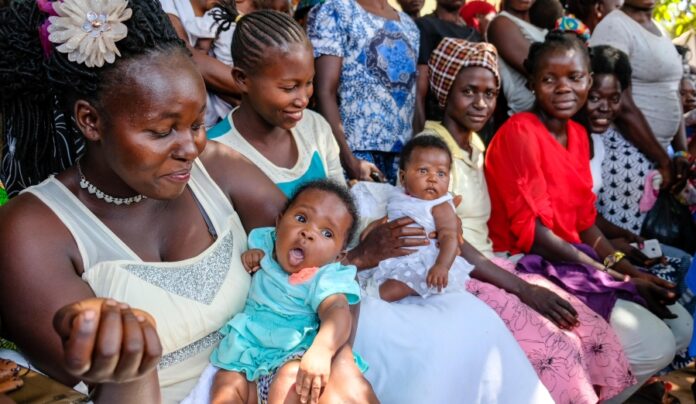A recent study by Chekero, T. (2024) titled “Traditional medicine and religious approaches in adapting to maternal and infant health threats among Zimbabwean migrant women in Giyani, South Africa” published in Canadian Journal of African Studies/Revue canadienne des études africaines, by Taylor & Francis, shows that Zimbabwean migrant women and their children in Giyani face significant health threats due to a lack of access to public health services.
“
Zimbabwean migrant women in South Africa rely on traditional and spiritual practices due to limited public health access. – Chekero, T. 2024
The article delves into the experiences of Karanga Zimbabwean migrant women residing in Giyani, South Africa, and how they navigate health challenges through traditional medicine and religious practices. These women, who often encounter obstacles such as limited access to public health services and xenophobia, adopt a blend of traditional and spiritual approaches to safeguard their health and that of their children. In the absence of adequate public healthcare, these migrant women rely heavily on traditional healers and Christian spiritual practices to address health concerns. Traditional medicine plays a crucial role in their healthcare strategies, particularly for treating conditions like nhova (a sunken fontanelle in infants) and rigoni (strawberry haemangiomas, which are benign vascular tumors). The use of traditional remedies and spiritual healing not only provides them with practical solutions but also reinforces their cultural identity and community ties. The study employs a range of qualitative research methods, including key informant interviews, unstructured interviews, and life histories, to gather comprehensive data on the women’s experiences and coping mechanisms. By exploring their narratives, the research underscores the significance of integrating traditional and spiritual practices into healthcare strategies, particularly in contexts where formal health services are inaccessible or inadequate. This approach highlights the resilience and resourcefulness of migrant communities in overcoming health disparities and navigating the complexities of their new environments.
How the study was conducted
The study triangulated both primary and secondary techniques. Primary data was collected using focus group discussions (FGDs) and open-ended interviews. Three FGDs were conducted, each involving twelve adult Zimbabwean migrant women. Additionally, 12 individual open-ended interviews were conducted using snowballing and availability sampling techniques. The participants were Zimbabwean migrant women who had resided in South Africa for at least two years. They were identified through social networks and collaboration with the Treatment Action Campaign (TAC). The University of Cape Town’s ethics committee provided methodological recommendations to ensure sensitivity to spousal relations and other ethical concerns. Discourse analysis was employed to gain insights into the experiences of migrant women within the Tsonga social and cultural context.
What the authors found
The author found that Zimbabwean migrant women and their children in Giyani face significant health threats due to a lack of access to public health services. These women use traditional medical and spiritual faith-healing approaches to mitigate health risks. In addition, their healthcare choices are influenced by how they detect, diagnose, and define illness, blending traditional and religious practices. Furthermore, the study found that despite their vulnerabilities, the women demonstrated creativity and agency in devising strategies to protect their health and that of their children.
Why is this important?
Highlighting Health Inequities: It brings attention to the health disparities faced by Zimbabwean migrant women in South Africa, particularly their limited access to public health services.
Cultural Sensitivity: By understanding the traditional and spiritual practices these women use, healthcare providers can develop more culturally sensitive and inclusive health services.
Policy Implications: The findings can inform policymakers to create better support systems and policies that address the unique needs of migrant communities, reducing the impact of xenophobia and improving overall health outcomes.
Empowerment and Agency: The study showcases the creativity and resilience of these women, highlighting their agency in protecting their health and that of their children despite significant challenges.
What the authors recommended
- The author emphasizes the need for better access to public health services for migrant women to reduce their reliance on traditional and spiritual healing practices.
- Healthcare providers should incorporate an understanding of traditional and religious practices into their services to make them more inclusive and effective for migrant communities.
- The author recommends that policymakers should address the systemic issues that contribute to the health vulnerabilities of migrant women, including xenophobia and a lack of healthcare access.
- The author advocates that strengthening support networks for migrant women can help them navigate health challenges more effectively.
In conclusion, the study illuminates the significant health challenges faced by Zimbabwean migrant women in Giyani, South Africa, due to inadequate access to public health services. It reveals how these women navigate their health concerns through a combination of traditional medicine and spiritual practices, highlighting their resilience and resourcefulness in the face of adversity. The findings underscore the importance of culturally sensitive healthcare services and the need for policy reforms that address the systemic barriers affecting migrant communities. By integrating traditional and faith-based approaches into broader health strategies, and improving access to formal healthcare, we can better support these women in overcoming health disparities and ensuring the well-being of their families.
















 The African Research (AR) Index is a comprehensive scholarly directory and database focused explicitly on journal publishers that publish and disseminate African research.
The African Research (AR) Index is a comprehensive scholarly directory and database focused explicitly on journal publishers that publish and disseminate African research.

